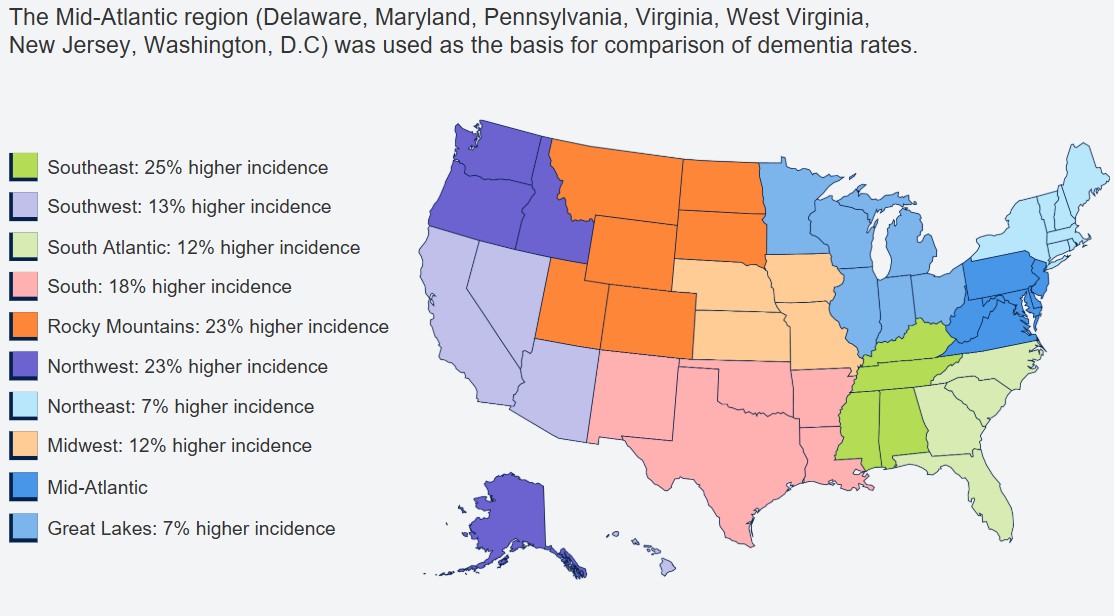Dementia Hot Spots: Is Your Region Raising Your Risk?
Why a 25% higher dementia risk could be tied to your U.S. location. But you're not powerless; there are 14 ways to lower your risk.

Ellen B. Kennedy

Profit and prosper with the best of Kiplinger's advice on investing, taxes, retirement, personal finance and much more. Delivered daily. Enter your email in the box and click Sign Me Up.
You are now subscribed
Your newsletter sign-up was successful
Want to add more newsletters?
Do you live in a region considered a dementia hot spot, or a region of the country with elevated rates of dementia?
The risk of dementia varies surprisingly across the United States; there are significant geographic disparities in the rates of diagnoses, with people in certain areas seeing dementia rates as much as 25% higher than the baseline.
Dementia is a common medical condition among older Americans, with as many as one in 10 adults age 65 and older having the disease, whether mild or severe. This means millions suffer from the condition, and, with the aging baby boomer population, an estimated 9 million people in the U.S. could have dementia by 2030.
From just $107.88 $24.99 for Kiplinger Personal Finance
Become a smarter, better informed investor. Subscribe from just $107.88 $24.99, plus get up to 4 Special Issues

Sign up for Kiplinger’s Free Newsletters
Profit and prosper with the best of expert advice on investing, taxes, retirement, personal finance and more - straight to your e-mail.
Profit and prosper with the best of expert advice - straight to your e-mail.
Here's where dementia rates are the lowest and highest, along with some details on potential reasons why people in some areas might be more likely than others to develop serious memory issues.
Dementia hot spots: The areas with the highest and lowest risks of dementia
Researchers at the University of California San Francisco, conducted a large-scale study of more than 1.2 million older veterans enrolled in the Veterans Administration medical system from 1990 to 2021. Participants were studied for a period of 12.6 years, and dementia rates were calculated per 1,000 person-years.
The data, which was published in JAMA Neurology, revealed that the lowest rates of dementia occurred in the Mid-Atlantic region. Within this region of the country, which includes Delaware, Maryland, New Jersey, Pennsylvania, Virginia, Washington, D.C. and West Virginia, there were 11.2 cases of dementia per 1,000 person-years.
Since this region had the lowest incidence rates, it became the baseline against which other regions were compared, revealing shocking geographic disparities. Specifically:
- The Southeast region had dementia rates 25% higher than the Mid-Atlantic baseline.
- Both the Northwest and Rocky Mountain regions saw 23% higher rates
- Incidence rates in the South were 18% higher .
- Rates were 13% higher in the Southwest.
- Both the Midwest and South Atlantic had 12% higher rates.
- Rates were 7% higher in the Northeast and the Great Lakes.
Researchers accounted for other factors affecting dementia risks, such as age, rates of cardiovascular disease, race and rural vs urban living, as rural areas tend to see higher rates of dementia. Even after adjusting for these factors, the regional differences persisted.
These differing rates of dementia risk are illustrated on the map below, which compares nine U.S. regions with the Mid-Atlantic.

Why are the geographic disparities so stark?
This study did not provide conclusive answers as to why there is such significant regional variation in dementia diagnoses. However, study authors put forth several potential theories to help explain the discrepancy.
“Quality of education, early life conditions and environmental exposures may be among those factors,” said Christina Dintica, and one of the study's authors.
Past research has also suggested that factors such as labor market conditions, environmental hazards, structural racism and overall adult health and mortality can make an impact.
Still other studies have shown that the difference in diagnosis rates can be largely explained by differences in health systems rather than by an actual disparity in dementia rates — meaning that just because more people are diagnosed in a particular location does not mean that more people have the condition, just that more people are likely to seek help, or doctors are more likely to identify the issue.
Untangling geography as a risk factor is challenging, even in small hot spots. For example, Starr County, Texas, near the Mexican border, has a dementia rate that is double that of the U.S. average of those on Medicare, affecting about one in five people, according to The Atlantic (pay wall). It's unclear whether the county's exposure to pollution is responsible or if the numerous risk factors that accumulate in a poor community with a strained health care system are to blame.
Researchers have made clear that further scientific examination is necessary to provide more clarity on the reasons for the disparities. They also suggest that simply being aware of the disparate risk levels can be helpful to policymakers and potential future dementia patients.
"These results underscore the influence of regionally patterned risk factors or diagnostic practices, highlighting the importance of tailored health care strategies, public health initiatives, and policy reforms," the study states.
The good news: Reducing your dementia risk
While news of geographic disparities in dementia rates is disturbing, moving isn't likely to be a solution to cut your risk if you're an older adult. Whatever the environmental or other factors that you've been exposed to are likely already baked in.
The good news (yes, there is some good news) is that you can still reduce your risk. According to the Lancet Commission on Dementia Prevention, up to 45% of dementia cases are preventable. Here are the 14 ways the Commission recommends to protect your brain and reduce your risk.
- Complete your secondary education.
- Address hearing loss by getting a hearing aid.
- Lower your cholesterol if it's elevated.
- If you've been diagnosed with depression, get treatment.
- Avoid traumatic brain injury by wearing helmets and seatbelts and avoiding falls.
- Aim for 75 minutes (at the minimum) of aerobic activity per week.
- Avoid type 2 diabetes or get treatment for diabetes and pre-diabetes.
- Don't smoke, or quit if you're a smoker.
- Treat high blood pressure.
- Maintain a healthy weight.
- If you drink, do so only in moderation.
- Avoid social isolation and loneliness.
- Keep your eyes and vision healthy.
- Reduce your exposure to air pollution by monitoring your local air quality index and limiting your outdoor activities on days with poor air quality. This is especially important if you live in areas affected by wildfires. Real estate company Redfin has published property-level air quality data, so you can see your home's overall risk. Scroll to the climate section on your home's page and select "air factor."
Other studies have recommended keeping your mind active with games, puzzles and lifelong learning.
Taking these steps is a lot easier than packing your bags and moving, and they can be one of the best options you have for keeping your mind sharp as you age.
Read More
Profit and prosper with the best of Kiplinger's advice on investing, taxes, retirement, personal finance and much more. Delivered daily. Enter your email in the box and click Sign Me Up.

Christy Bieber is an experienced personal finance and legal writer who has been writing since 2008. She has been published by Forbes, CNN, WSJ Buyside, Motley Fool, and many other online sites. She has a JD from UCLA and a degree in English, Media, and Communications from the University of Rochester.
- Ellen B. KennedyRetirement Editor, Kiplinger.com
-
 3 Smart Ways to Spend Your Retirement Tax Refund
3 Smart Ways to Spend Your Retirement Tax RefundRetirement Taxes With the new "senior bonus" hitting bank accounts this tax season, your retirement refund may be higher than usual. Here's how to reinvest those funds for a financially efficient 2026.
-
 5 Retirement Tax Traps to Watch in 2026
5 Retirement Tax Traps to Watch in 2026Retirement Even in retirement, some income sources can unexpectedly raise your federal and state tax bills. Here's how to avoid costly surprises.
-
 Trump's New Retirement Plan: What You Need to Know
Trump's New Retirement Plan: What You Need to KnowPresident Trump's State of the Union address touched upon several topics, including a new retirement plan for Americans. Here's how it might work.
-
 3 Smart Ways to Spend Your Retirement Tax Refund
3 Smart Ways to Spend Your Retirement Tax RefundRetirement Taxes With the new "senior bonus" hitting bank accounts this tax season, your retirement refund may be higher than usual. Here's how to reinvest those funds for a financially efficient 2026.
-
 Trump's New Retirement Plan: What You Need to Know
Trump's New Retirement Plan: What You Need to KnowPresident Trump's State of the Union address touched upon several topics, including a new retirement plan for Americans. Here's how it might work.
-
 Buy and Hold … or Buy and Hope? It's Time for a Better Retirement Planning Strategy
Buy and Hold … or Buy and Hope? It's Time for a Better Retirement Planning StrategyOnce you're retired, your focus should shift from maximum growth to strategic preservation and purposeful planning to help safeguard your wealth.
-
 Your Legacy Is More Than Your Money: How to Plan for Values, Not Just Valuables
Your Legacy Is More Than Your Money: How to Plan for Values, Not Just ValuablesLegacy planning integrates your values and stories with legal and tax strategies to ensure your influence benefits loved ones and good causes after you're gone.
-
 4 High-End Experiences Worth the Splurge After 50
4 High-End Experiences Worth the Splurge After 50These curated date ideas provide the perfect backdrop for couples ready to enjoy the very best that the world has to offer.
-
 My Grandkids Want Me to Donate to Their Teams and School Fundraisers. I Adore Them, but I'm on a Budget.
My Grandkids Want Me to Donate to Their Teams and School Fundraisers. I Adore Them, but I'm on a Budget.When your heart says "yes" but your wallet says "no," there is still a way forward. Here's what financial pros say.
-
 Your Retirement Age Is Just a Number: Today's Retirement Goal Is 'Work Optional'
Your Retirement Age Is Just a Number: Today's Retirement Goal Is 'Work Optional'Becoming "work optional" is about control — of your time, your choices and your future. This seven-step guide from a financial planner can help you get there.
-
 It's Time to Bust These 3 Long-Term Care Myths (and Face Some Uncomfortable Truths)
It's Time to Bust These 3 Long-Term Care Myths (and Face Some Uncomfortable Truths)None of us wants to think we'll need long-term care when we get older, but the odds are roughly even that we will. Which is all the more reason to understand the realities of LTC and how to pay for it.